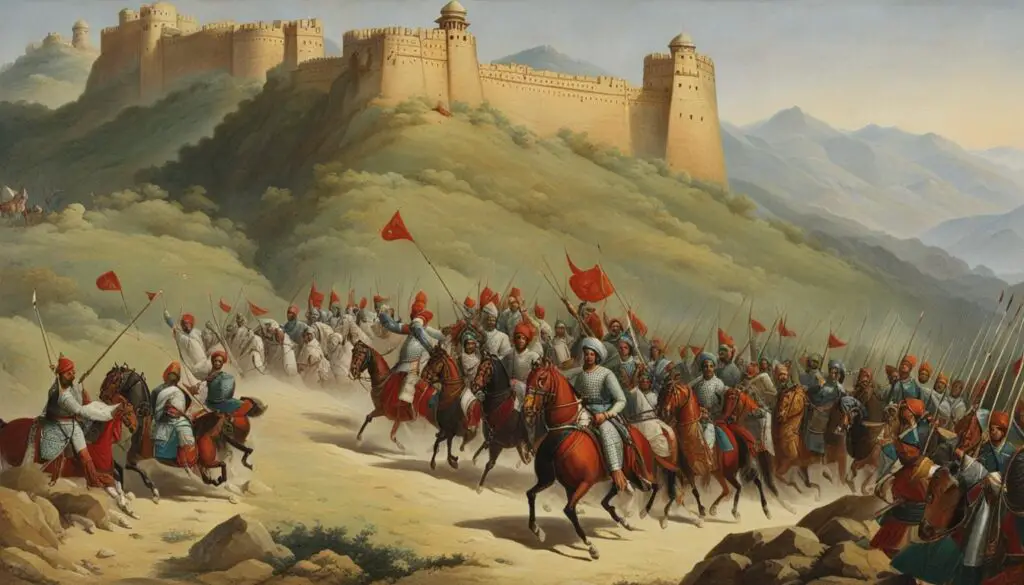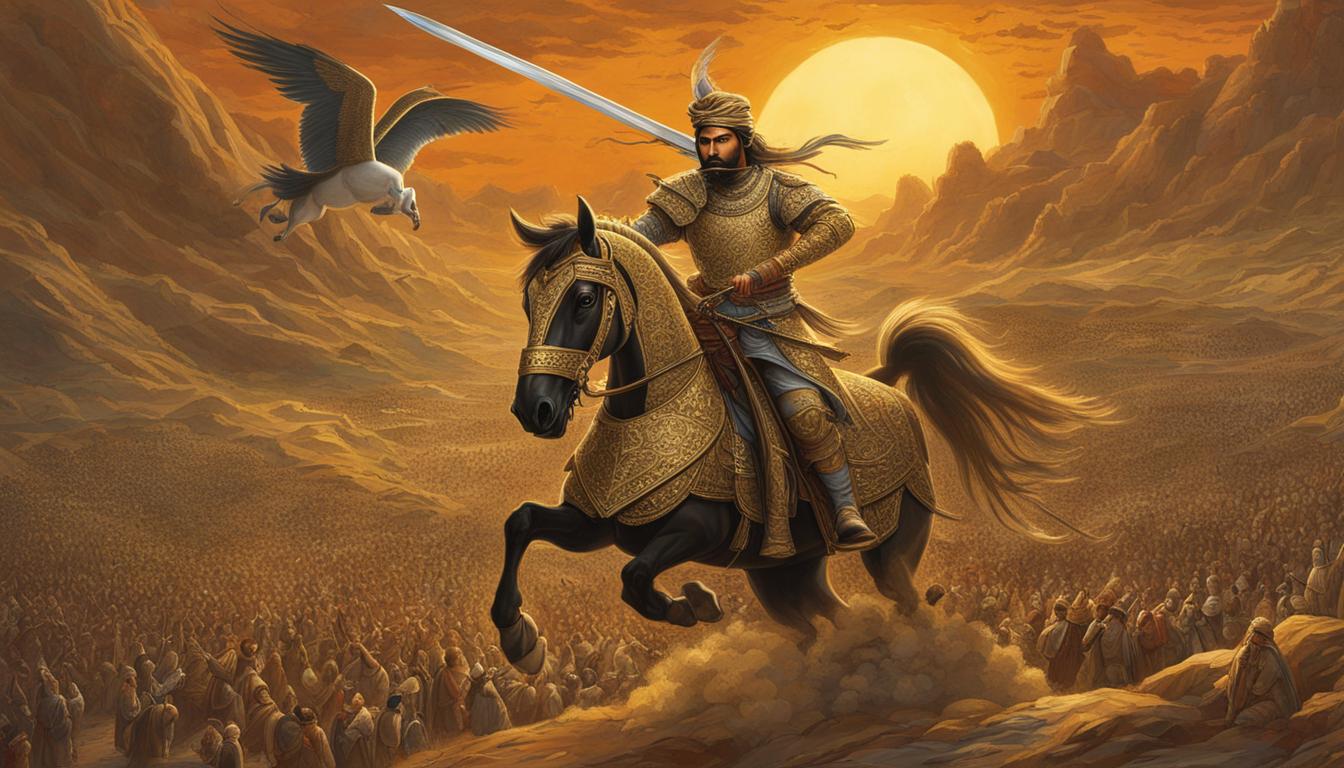Did you know that the conquests of Muhammad Ghori changed the course of Indian history? Explore the intriguing story of this remarkable ruler who transformed the political landscape of India and laid the foundation for Muslim rule in the subcontinent.
Key Takeaways:
- Muhammad Ghori, Sultan of the Ghurid Empire, played a pivotal role in the Muslim conquest of India.
- His victories in the Battles of Tarain opened the way for further Muslim invasions and the establishment of the Delhi Sultanate.
- Muhammad Ghori appointed his slave general, Qutubuddin Aibak, as the Viceroy of the Indian provinces, marking the beginning of the Delhi Sultanate.
- The Ghurid dynasty faded after Muhammad Ghori’s assassination, but his conquests left a lasting legacy in Indian history.
- The Delhi Sultanate, established by Muhammad Ghori’s successors, ushered in a new era of Muslim rule in India.
Muhammad Ghori’s Conquests in India
In his quest to expand the Ghurid empire, Muhammad Ghori embarked on a series of conquests in India. His strategic maneuvers and military prowess enabled him to secure victories in key regions, paving the way for the establishment of the Delhi Sultanate.
One of Muhammad Ghori’s early conquests was the capture of Multan and Uch in 1175. These cities were previously under the rule of Ghaznavid governors but fell to the hands of the ambitious Ghurid sultan.
However, his path to domination faced a significant hurdle in the form of Prithviraj Chauhan, the formidable ruler of Delhi and Ajmer. In the first Battle of Tarain in 1191, Prithviraj emerged victorious, inflicting a setback on Muhammad Ghori’s aspirations.
Undeterred by his initial defeat, Muhammad Ghori returned to the battlefield with renewed strategy and determination. In the second Battle of Tarain in 1192, he decisively defeated Prithviraj Chauhan, seizing control of Ajmer and Delhi. This marked a turning point in Indian history as it set the stage for further Muslim conquests in the region.
Following his triumphs at Tarain, Muhammad Ghori appointed Qutubuddin Aibak, one of his trusted slave generals, as the Viceroy of the Indian provinces. Qutubuddin Aibak later embarked on his own conquests, subjugating Meerut, Bulandshahar, Aligarh, and various other regions. These conquests culminated in the transformation of Delhi into the capital of the newly established Delhi Sultanate.
Throughout his conquests, Muhammad Ghori laid the foundation for a powerful Muslim presence in India. His victories and the subsequent establishment of the Delhi Sultanate shaped the course of history, marking the beginning of an era of Muslim rule in the subcontinent.

| Conquest | Year |
|---|---|
| Multan | 1175 |
| Uch | 1175 |
| First Battle of Tarain | 1191 |
| Second Battle of Tarain | 1192 |
| Ajmer | 1192 |
| Delhi | 1192 |
Legacy of Muhammad Ghori
Muhammad Ghori’s conquests in India had a profound and lasting impact on the subcontinent. Through his victories, he established a powerful Muslim rule in India, laying the foundation for the Delhi Sultanate and the subsequent Muslim dynasties that would govern the region for centuries.
Although Muhammad Ghori did not have any biological heirs, he treated his Turkic slaves like his own sons and designated them as his successors. This act of recognizing and empowering his loyal servants proved crucial in the continuity of his legacy. Qutubuddin Aibak, one of his slave generals, inherited the throne and became the ruler of Delhi in 1206, marking the beginning of the Mamluk dynasty and the Delhi Sultanate.
Under his successors’ rule, the Delhi Sultanate expanded its territories, consolidating its authority over vast parts of northern India. Other notable generals, such as Nasir-ud-Din Qabacha, ruled over Multan, while Ikhtiyar Uddin Muhammad bin Bakhtiyar Khilji established control in parts of Bengal. This period of Muslim rule in India brought about significant social, cultural, and architectural developments, leaving an indelible mark on the subcontinent’s history.
While the Ghurid dynasty itself faded away after Muhammad Ghori’s assassination, his conquests paved the way for a new era of Muslim rule in India under the Delhi Sultanate. The Sultanate’s legacy includes prominent cultural and architectural landmarks such as the Qutub Minar, which stands as a testament to the enduring influence of Muhammad Ghori and his successors.
FAQ
Who was Muhammad Ghori?
Muhammad Ghori, also known as Shihabud Din Muhammad Ghori, was born in 1149 CE in Ghor, present-day Afghanistan. He belonged to the Ghurid dynasty and ascended the throne of Ghazni in 1173, establishing the Ghurid empire.
What were Muhammad Ghori’s conquests in India?
Muhammad Ghori launched a series of invasions in India, starting with the capture of Multan and Uch in 1175. He faced initial defeats but ultimately defeated Prithviraj Chauhan, one of the most powerful Rajput rulers, in the second Battle of Tarain in 1192. These conquests opened the way for further Muslim rule in India under the Delhi Sultanate.
How did Muhammad Ghori’s conquests impact India?
Muhammad Ghori’s conquests established a secure and powerful Muslim kingdom in India. Although he had no offspring, he treated his Turkic slaves like his sons and appointed Qutubuddin Aibak, one of his slave generals, as the Viceroy of the Indian provinces. Qutubuddin Aibak went on to become the ruler of Delhi, marking the beginning of the Mamluk dynasty and the Delhi Sultanate.
What was the legacy of Muhammad Ghori?
Muhammad Ghori’s conquests laid the foundation for Muslim rule in India under the Delhi Sultanate. His successors, including Qutubuddin Aibak, Nasir-ud-Din Qabacha, and Ikhtiyar Uddin Muhammad bin Bakhtiyar Khilji, continued to expand Muslim influence in different parts of India.
Source Links
- https://en.wikipedia.org/wiki/Muhammad_of_Ghor
- https://en.wikipedia.org/wiki/Ghurid_dynasty
- https://www.clearias.com/muhammad-ghori/

